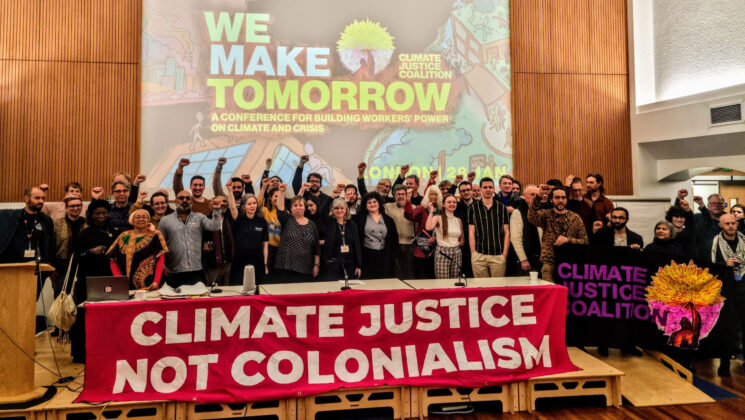I joined 150 other trade union activists for the We Make Tomorrow conference to discuss how we can build workers’ power on climate and crisis.
Before the conference even started there was a great opportunity to network.
The hall was still being set up when I got to Hamilton House, so I had time to chat to Jackie Simpkin from War on Want, after recognising her from last year’s UNISON Eastern international seminar, and to Ester Davies, who had co-chaired the Friends of the Earth summer gathering last year.
When the hall started filling up Stephen Smellie, from South Lanarkshire, stopped to talk to me, he attended the same online green rep training as me, as did Julie Fogen, who I met later in the day. It was nice to see them both in person.
There were plenty of speakers: Sam Gurney from the TUC kicked things off talking about the need for well-funded green jobs, with workers (and their unions) at the heart of planning and on decent terms and conditions.
Filipino labour lawyer and activist Renecia “Luke” Espiritu joined the meeting via video link to urge us to make the CoalFree2030 initiative a reality. This pushes for the phased-out transition from fossil fuels to 100% renewable energy sources.
Luke said that those with power had spent the last 150 years accumulating wealth in the Philippines, at the cost of the environment. It’s been a system of over-extraction, overproduction, and overconsumption in the name of profit.
He argued that addressing climate change requires systemic change too, but warned that capitalist rulers would not accept solutions that don’t guarantee them profits.
John Moloney, assistant general secretary of civil servants’ union PCS, was next. He echoed concerns that large companies couldn’t solve the climate crisis, pointing to the US where firms are not adopting a carbon charge. He also flagged the lack of political will, with politicians watering down green proposals following the backlash to ULEZ in London.
He said that a turn towards ‘green collective bargaining’ raised the prospect of strikes over climate change, but pointed out that Britain’s anti-union laws may have a dampening effect.
The conference split into workshops next and I went along to Health Care and Public Services – Good Green Jobs.
UNISON NEC member Julie Fogen recounted her experiences working in a cost-cutting academy school. Staff work through hot temperatures in the summer with only wet paper towels to keep children cool, while in winter they’re freezing. Despite this, net zero is just not on the agenda for schools, she warned.
Andy Warren from the Fire Brigades Union reported that every day he sees climate change threatening the safety of public buildings.
Stephen Smellie was up next, talking about the importance of care workers. He recalled that during recent flooding in Scotland it was up to care workers with shoddy PPE to find service-users stranded in their homes somewhere safe to stay.
PCS activist Katrine Williams focused on the Lucas plan, an attempt by aerospace workers to save jobs by greening their industry in 1976. It included over 150 designs for alternative products, including wind turbines and hybrid cars. A modern-day version is taking place in Florence, Italy, where laid-off workers have occupied their GKN plant for over two years.
Individual unions met after lunch, there were 11 people present at the UNISON meeting, with branches as far afield as South Lanarkshire, York and Lambeth represented.
War on Want director Asad Rehman rounded off proceedings talking about the various threats posed by climate change and how they go hand in hand with attacks on the poorest in society. He said the trade union movement struggles for emerging climate Jobs, communities and people’s right to live in dignity, right to food and energy.
Organising people is the key and raising people’s political awareness builds climate power.
Join UNISON’s green network
The climate emergency is happening now. And it’s directly impacting UNISON members, their workplaces and the crucial services they provide.
There’s still time. By harnessing the collective power of our membership, and joining with others around the world, we’ll ensure a safe, healthy and thriving future for generations to come.

